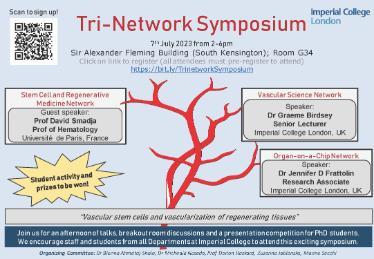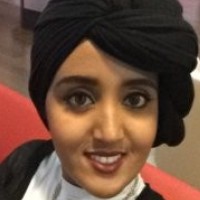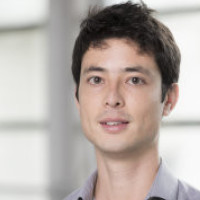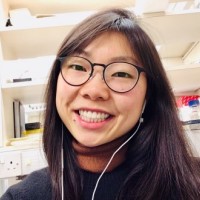Tri-Network Symposium

The Vascular Science, Stem Cell and Regenerative Medicine and Organ-on-a-chip Networks are organizing an afternoon symposium on the 7th of July 2023 from 2-6pm in SAF, South Kensington. By discussing overlapping topics involving vascular biology, regenerative medicine, stem cell biology and organoids we aim to enable the development of transformative ideas and interdisciplinary collaborations. There will be three talks from exciting speakers including Dr Graeme Birdsey and Dr Jeniffer Fratollin (Imperial College London) and the international guest speaker Prof David Smadja (University of Paris). All participants will be able to further discuss these topics in 3 breakout sessions.
We are also organising a student challenge. Postgraduate students (pre-selected into teams) will attend one of the breakout sessions and work closely to create a powerpoint presentation summarising the discussions of each break-out session. Prizes will be awarded to the best presentation!
You are welcome to attend without taking part in the challenge too, the coffee break will be a great opportunity to network!
Past news
April 2020
Seminars
- The King’s College London Centre for Stem Cells and Regenerative Medicine Stem Cells @ Lunch series is also now running virtually.
- The Francis Crick Institute’s Stem Cell Forum is back via Zoom every two weeks.
July 2020
ISRMN sponsored the participation of ISRMN members in the 2020 Virtual ISSCR and they gave us their feedback about the conference in general and their favourite discussions. Check their stories below.
ISSCR Testimonials
- Dr Isra Marei – Honorary Research Fellow
- Dr Olivia Cruz – Post-Doctoral Researcher
- Marine Secchi – MRes student
- Dr Nura Mohamed – Post-doctoral Researcher
- Dr Alice Agliano – Post-doctoral Researcher
- Dr Cristina Torres – Post-doctoral Researcher
- Dr James Armstrong – Post-doctoral Fellow
- Ines Obregon – MRes student
- Dr Andy Tay Kah Ping – Post-doctoral Researcher
- Chunliang (Luke) Wang – PhD student
- Dr Di Hu – Post-doctoral Researcher
Isra Marei is interested in endothelial progenitor cells and their use for tissue engineering and regenerative medicine, focusing on the cardiovascular complications of diabetes.
"I was very impressed by the virtual meeting organization and the website interface that was designed to imitate an on-site meeting, maintaining the networking element through forums dedicated to scientific conversations and career development. On the virtual exhibit hall, I was mostly fascinated by the nanolive imaging system which allows the visualization of live cells in 3D. One more advantage of the virtual meeting that I really like is that the sessions are available on demand.
I particularly enjoyed the workshop on clinical translation “modeling stem cells for discovery”. The session focused on the use of stem cells to model diseases and develop new therapeutics. The presidential talk entitled: cell atlas as road maps to development, by Aviv Regev (MIT), with focus on single cell genomics. The talk focused on some tools and computational methods to learn about cells fate and lineage and developmental disorders. The speaker also talked about the human cell atlas, which aims to create comprehensive maps of all human cells utilizing tools such as single cell genome and spatial analysis.
It was very convenient that the sessions were later available on demand!"
Dr Olivia Cruz uses stem-cell-derived cardiomyocytes for cardiac regeneration.
"The ISSCR is one of the most important conferences regarding stem cell research and application to human health, this meeting gathers the world's leaders in the field and knowing this, I was very much looking forward to it.
My favourite session was the concurrent Session III- clinical application: cardiac and muscles presentinga lot of scientific advances regarding the cardiovascular field. I was particularly interested in the talk given by PhD Sebastian Uzel from Harvard University. He is working on 3D printing vessels to make engineered heart tissues, his group made incredible advances in this area.
My favourite talk was presented by Professor Emma Lundberg from KTH Royal Institute of Technology. She is participating in a fantastic project The Cell Atlas, part of The Human Protein Atlas (Swedish-based program), an international effort for mapping every type of cells of human body using large-scale immunostaining and high-resolution microscopy. She said that more than 332, 000 gamers around the world were involved to classify more than 32 million of images using an online game. That was awesome!!
I would like to mention a particular session: women in science panel, I found it very inspirational and I felt happy about knowing stories of successful female researchers."
Marina Secchi is working on HSCs dynamics in the bone marrow niche.
"ISSCR was an eye-opening conference about the incredible research bringing stem cells to the clinic, as drug screens or therapeutic targets. The use of iPSCs as a model more physiologically relevant than animal models is very exciting for drug discovery. Some of my favourite talks include the stem cell fate mapping one from Dr. Allon Klein illustrating the idea of converging fates. Super interesting use of timer proteins by Dr. Shangqin Guo's lab to look at progenitors dynamics and transformation! So much detail of the heterogeneity of populations using single cell RNA sequencing! What a great time to be doing stem cell research!
Being in London, some talks were happening in the middle of the night for me but on the bright side the virtual format of the conference allowed me to watch more talks than I physically have could. The women in science panel was very inspiring! "
Dr Nura Mohammed uses Metal-Organic-Frameworks (MOFs) as a drug delivery system to enhance prostacyclin analogues.
 "Attending the ISSCR Virtual-Meeting was unique, interesting and I enjoyed the experience. The virtual representation of the meeting in terms of web-design, chat rooms, online-schedule, the ability to have agenda for the talks you want to attend were impressive. In addition, the ability to attend the high-demand talks, to go through posters while listening to the presenters explain their work was encouraging and made it easier to engage. Talks were delivered by some of the world's expertise in stem cells and discussed the different fields that can benefit from this technology. Also, the meeting gave us the opportunity to attend talks given by other world-leaders who have similar interests and work in related research platforms. Furthermore, the meeting created networking opportunities for the attendees which are really important especially during the current pandemic. It created social and academic networking platforms were nurturing and filled with knowledge. Besides, creating a section in the meeting for young scientists who are seeking job opportunities and career advice was impressive.
"Attending the ISSCR Virtual-Meeting was unique, interesting and I enjoyed the experience. The virtual representation of the meeting in terms of web-design, chat rooms, online-schedule, the ability to have agenda for the talks you want to attend were impressive. In addition, the ability to attend the high-demand talks, to go through posters while listening to the presenters explain their work was encouraging and made it easier to engage. Talks were delivered by some of the world's expertise in stem cells and discussed the different fields that can benefit from this technology. Also, the meeting gave us the opportunity to attend talks given by other world-leaders who have similar interests and work in related research platforms. Furthermore, the meeting created networking opportunities for the attendees which are really important especially during the current pandemic. It created social and academic networking platforms were nurturing and filled with knowledge. Besides, creating a section in the meeting for young scientists who are seeking job opportunities and career advice was impressive.
I attended several talks given by multiple speakers and I enjoyed the talks that discussed endothelial cells, their involvement in diseases, and how we can use them in disease modeling which is my research area. My favorite talk was “Modeling Development and Disease: Hematopoietic and Endothelial Cells”. I also enjoyed the “ISSCR Response to COVID-19”; integrating different research fields, including tissue and stem cell technology with the current pandemic was clever and important step that I appreciate the meeting organizers for. "
Dr Alice Agliano is studying how cells interface with different materials.
"This year the annual meeting of the International Society for Stem Cell Research (ISSCR) has gone virtual due to the COVID-19 pandemic. Despite some minor issues due to loss of the connection, such as video/audio not working, or slides not moving forward, I think it has been a great success. The organizers managed to put together this massive conference in very little time, with parallel sessions and several prestigious speakers, posters and numerous opportunities to ask questions and network as if it was a real conference, but from the comfort/security of our own home.
I came across how stem cells can be used for drug discovery, how endogenous stem cells can be used as targets or as drugs to treat and cure several diseases. However, independently of the field, throughout the conference three have been the major topics that were constantly mentioned in most of the talks:
- the use of inducible pluripotent stem cells (iPSCs), how these can be manipulated genetically or pushed towards a specific lineage to identify their role in tissue regeneration
- the use of organoids to recreate the formation of a certain tissue/organ to better understand its development
- how relevant single cell RNA sequencing (scRNAseq) is to better understand the role of stem cells in development, regeneration, disease modelling and eradication"
Dr Cristina Torres is focusing on studying the DNA methylation dynamics in mESCs and during early embryos.
"The ISSCR 2020 meeting has been a completely new experience for me. During this difficult time for all of us, it was more necessary than ever to unite all those excellent and inspiring speakers in a new format of conference. Although hesitant at the beginning for the obvious limitation for networking, it was also a very convenient format that allows you to watch all the talks on demand and have a look with all the time you want to those interesting posters from home. Seven plenary session covered all the key topics in the stem cell field. Especially interesting for me was the Reprogramming and Regeneration session. I enjoyede the inspiring talk of Shinya Yamanaka (CiRA, Kyoto University, Japan). He shared his recent work to generate iPSCs stock in order to avoid the expensive and time-consuming individual specific iPSCs. His team isolated HLA homozygous iPSCs from eight donors that covers 40% of the population of Japan, four of them already in clinical trials. Another very interesting talk was the ISSCR Achievement Award Lecture by Fred H. Gage, who talked about DNA damage and repair in the neuronal lineage. As somatic mutations may occur at any time of life without resulting in any defect, they studied their accumulation in neural progenitor cells. He showed his most recent work identifying double strand breaks hotspots, specifically presence on long and actively transcribed genes, which lead them to link replication stress to this damage. Overall, it was a very refreshing and inspiring meeting very needed at this time. "
Dr James Armstrong is working on complex tissue engineering.
 "I last attended ISSCR in Boston in 2013 as a PhD student. It is fair to say that ISSCR 2020 Virtual was a very different experience! When I go to conferences, I like to see talks covering a range of topics, from those related to my own work (e.g., cartilage tissue) to unrelated science that I find generally interesting (e.g., reprogramming methods, organ-on-a-chip). This can be a major problem at large international conferences, where I find myself spending hours scheduling routes between different parallel sessions, often missing the beginning of talks or arriving at the back of a crowded lecture theatre, barely able to see the screen.
"I last attended ISSCR in Boston in 2013 as a PhD student. It is fair to say that ISSCR 2020 Virtual was a very different experience! When I go to conferences, I like to see talks covering a range of topics, from those related to my own work (e.g., cartilage tissue) to unrelated science that I find generally interesting (e.g., reprogramming methods, organ-on-a-chip). This can be a major problem at large international conferences, where I find myself spending hours scheduling routes between different parallel sessions, often missing the beginning of talks or arriving at the back of a crowded lecture theatre, barely able to see the screen.
ISSCR 2020 Virtual was a refreshing change! Not worrying about clashes or scheduling. Having a month to watch the talks, rather than a few days. Being able to watch talks in bed or in the garden. Being able to pause when I want a snack. Being able to rewind to double-check a missed detail. Being able to exit a talk when I realize it isn’t for me – without offending the speaker by “walking out.” For me, these factors made for a highly enjoyable and efficient conference experience! It helped that the speakers were generally high quality, with my favourites so far being talks from Madeline Lancaster, Roseanne Raftery, Irene De Lazaro, and Milica Radisic. The best conferences leave me feeling educated and inspired – and this is how I have felt after two weeks of ISSCR. The best bit is that I have several weeks more!
ISSCR 2020 Virtual is one part of a mini-revolution in online scientific events. Science is always striving to be inclusive but in-person conferences inherently exclude those that cannot attend due to travel costs, disability, caring responsibilities, or other factors. The lockdown has sparked a flurry of free webinars and (relatively) cheap online conferences – these have helped to break down some of these barriers. Removing travel, reducing costs, and making scientific events available to the public; these initiatives are aiding in the democratization of science. I speak on this topic as the organizer of the Virtual Seminars in Biomedical Science, relaying feedback that I have received from both speakers and attendees. While I hope that the world can return to normality as soon as possible, I do hope that online scientific events can remain a part of the post-pandemic scientific world.
I thank the International Society for Stem Cell Research for staging this event and the Imperial Stem Cell and Regenerative Medicine Network for the opportunity to attend."
Ines Obregon is working on a shape memory material for cardiac regeneration using stem cell derived cells.
"The ISSCR 2020 Virtual was my first conference. I was not sure what to expect and can say it has been an interesting experience. Multiple compelling plenaries, workshops and innovation showcases, juggling out when, how and what to join in, time zone differences, several “Ooohs”, “Aaahs” and “Hm, this is something!” all the while being in my study at home. I streamed stimulating plenaries and innovation showcases and still, after the conference was over, watched a few I had missed on demand. Becoming acquainted with computer science more recently, the plenary on Machine Learning and Computational approaches sparked interest and introduced me to new outlooks on computational data analysis which, although not entirely applicable to my research, were definitely thought-provoking. However, I must admit that I missed feeling the “science buzz” and excitement which put me in a more passive state than what I would have hoped, not putting myself out there in networking forums. Perhaps due to the multiple opportunities and institutions and talks and workshops, that I overdosed on choice. In that regard there has been a bit of disappointment but overall the experience has been memorable. The science was truly remarkable and every day I am in awe of all the minds that converge and achieve amazing developments. "
Dr Andy Tay Kah Ping is working on immune cell mediated tissue regeneration.
"ISSCR was one of the virtual meetings I attended during the COVID-19 pandemic. What I truly appreciated about the meeting was the virtual poster sessions. Usually in a physical meeting, it will be impossible to look at all the posters due to time constraint. However, the virtual poster sessions gave me an opportunity to look at all the posters, with special attention on posters that interest me. After this experience, I feel that perhaps conference organisers should consider virtual poster sessions in addition to in-person ones in the future."
Chunliang (Luke) Wang is working on lithography 3D printing for tissue regeneration.
" First, thanks for the sponsor from ISRMN to let me attend this fantastic ISSCR annual meeting. I attended several focused forums and was inspired by a lot of speeches. One of them was the speech about stem cells and aging. In this speech, Dr. Stevens talked about mapping microglia state and function in Alzheimer’s disease. Dysfunction of microglia cells caused neurodegenerative disorders such as Alzheimer disease and chronic pain. Dr. Stevens introduced their work regarding how microglia- specific pathways contribute to circuit dysfunction. They developed and optimized iPS-induced microglia models to dissect how AD genetic risk and brain environment alter microglia transcriptional and functional states and the consequences of specific microglia populations on synapse loss and neuroinflammation. This is an amazing work to use iPSC to build a diseased model and help understand the pathophysiology and molecular mechanisms behind the disease. I am so inspired by their work in terms of finding the key to induce iPSC to make a diseased model. By learning from this speech, it provokes me in my future research interest about building bone malignancy models. "
Dr Di Hu is investigating the molecular triggers of primordial germ cell epigenetic reprogramming.
 "The ISSCR 2020 Virtual was a brilliant showcase of advances in stem cells and regenerative medicine from across the globe. For me, the virtual conference worked well in terms of knowledge and information acquisition from extremely well-curated, cutting-edge talks, which could be revisited following the live stream via audiovisual recording. Like previous stem cell symposia that I attended, there was an emphasis on using the principles of normal embryo development to recapitulate cell types in vitro by directed differentiation. There was a further emphasis on using 3D, and clever bioengineered culture conditions as opposed to cells in 2D, for a more faithful in vitro recapitulation.
"The ISSCR 2020 Virtual was a brilliant showcase of advances in stem cells and regenerative medicine from across the globe. For me, the virtual conference worked well in terms of knowledge and information acquisition from extremely well-curated, cutting-edge talks, which could be revisited following the live stream via audiovisual recording. Like previous stem cell symposia that I attended, there was an emphasis on using the principles of normal embryo development to recapitulate cell types in vitro by directed differentiation. There was a further emphasis on using 3D, and clever bioengineered culture conditions as opposed to cells in 2D, for a more faithful in vitro recapitulation.
What stood out to me was the wealth of single-cell RNA-sequencing (scRNA-seq) data presented from large tissues and cell populations made feasible with advances like 10X Genomics. The technology has now developed to a point where asking for the heterogeneity within cell populations in any system may soon become routine. While there is an established analysis pipeline for scRNA-seq like there is for bulk RNA-seq, it would be interesting to see in future ISSCRs computational and statistical advances in making sense of these scRNA-seq data, particularly in associating together different time points. The machine learning section mentioned advances in image recognition abilities useful for assessing large datasets. Finally, it was heartening to see the use of stem cells in regenerative therapy, which also highlighted the importance of mouse models to test such therapies before clinical trials."